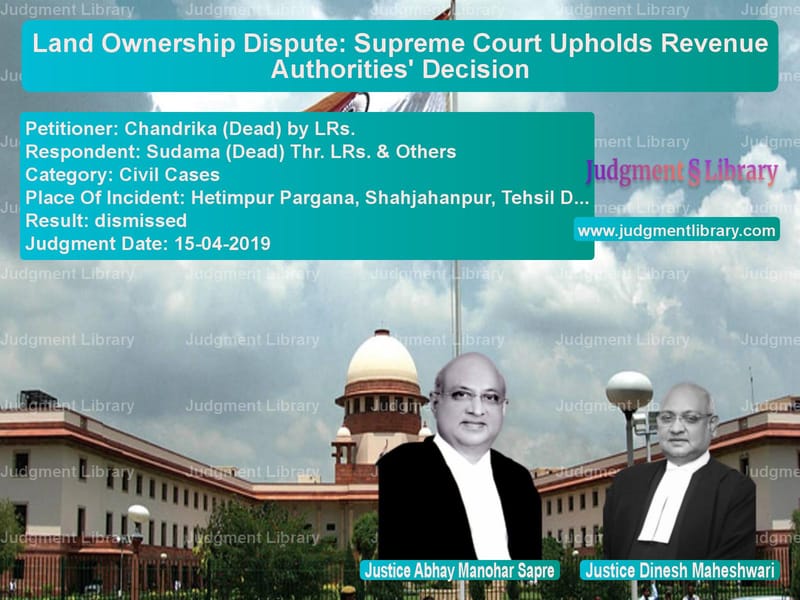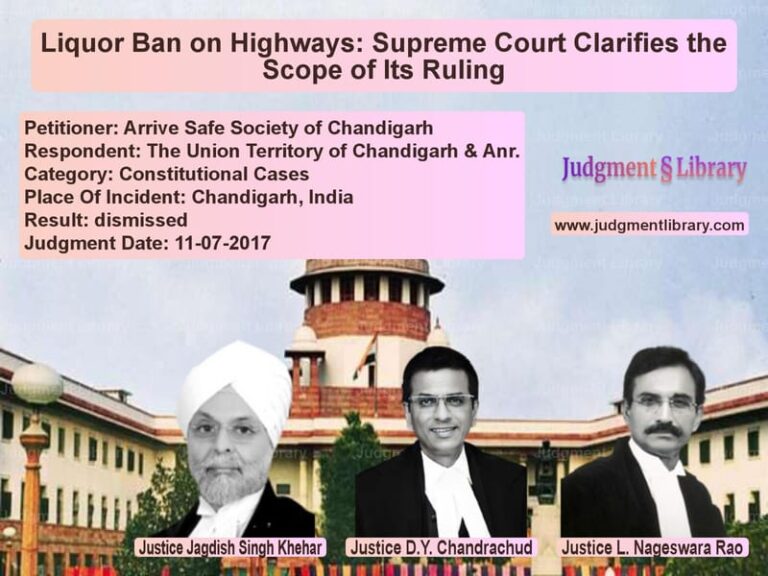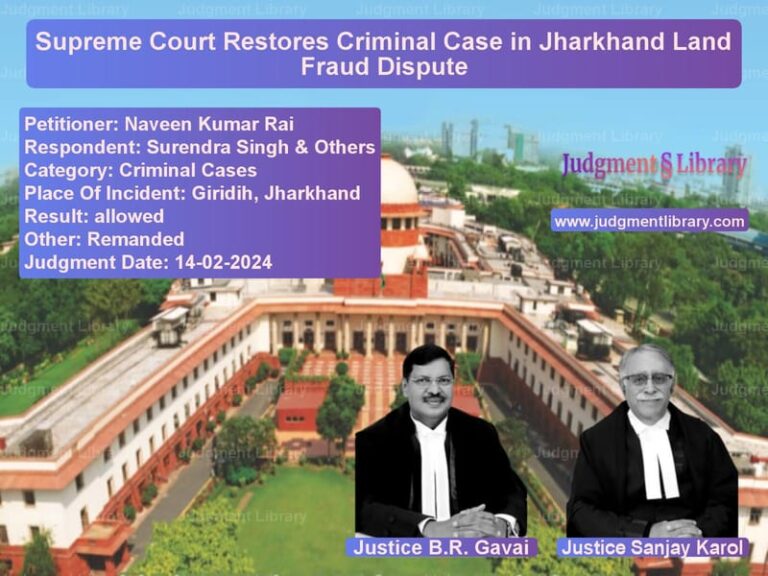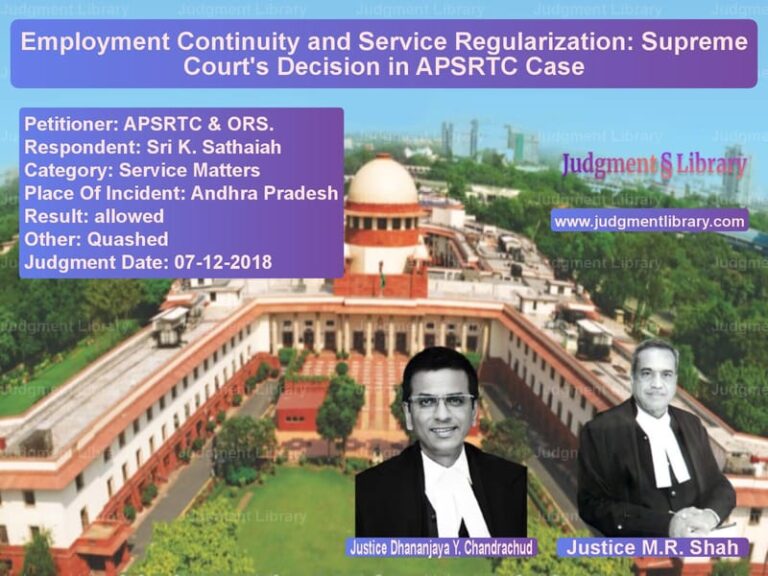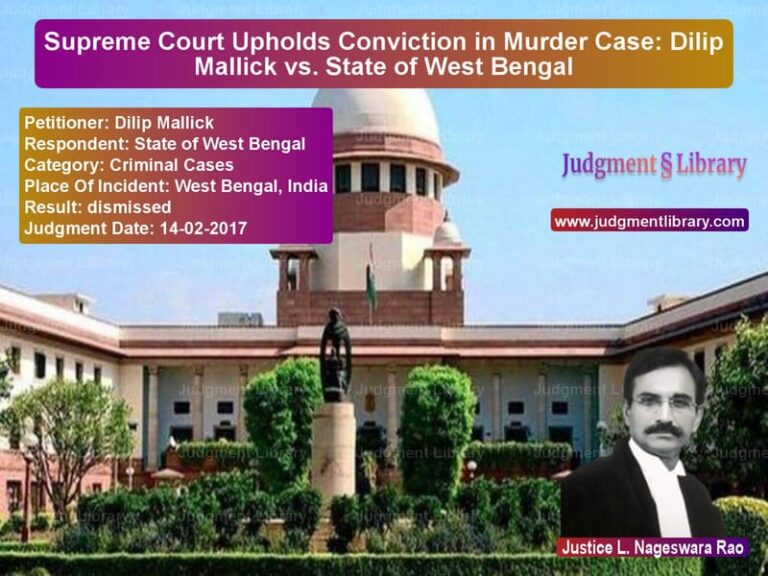Land Ownership Dispute: Supreme Court Upholds Revenue Authorities’ Decision
The Supreme Court of India has ruled in favor of the respondents in a land ownership dispute, dismissing the appeal filed by the legal heirs of the original appellant, Chandrika. The Court upheld the orders passed by the Revenue Authorities and the Allahabad High Court, which had recognized the respondents as the rightful owners of the disputed land.
Background of the Case
The dispute arose between two branches of the family of Sheo Sahai—one represented by Bechu (the respondents) and the other by Rajbali (the appellant’s predecessor-in-title). The conflict concerned multiple land parcels located in Hetimpur Pargana, Shahjahanpur, Tehsil Deoria, Uttar Pradesh. The respondents claimed that Rajbali had fraudulently got his name entered in the revenue records without any legitimate ownership rights.
Under Section 9-A(2) of the U.P. Consolidation of Holdings Act, 1953, the respondents challenged the entry of Rajbali’s name, leading to an inquiry by the Revenue Authorities. The Consolidation Officer, Settlement Officer, and Deputy Director of Consolidation ruled against Rajbali, directing that his name be removed from the records.
Rajbali’s legal heirs contested these decisions in the Allahabad High Court through a writ petition. The High Court dismissed the petition, affirming the findings of the Revenue Authorities. Subsequently, the appellants approached the Supreme Court.
Key Legal Issues
- Whether the name of the appellant’s predecessor was fraudulently entered in the revenue records.
- Whether the High Court erred in upholding the Revenue Authorities’ decision.
- Whether the findings of the Revenue Authorities constituted a concurrent finding of fact binding on the Supreme Court.
Arguments Before the Supreme Court
Appellants’ Contentions:
- The appellants argued that Rajbali had a rightful share in the land as a successor through Lalji, Bechu’s brother.
- They contended that the revenue entries should not have been altered as the land had been in their possession for years.
- The appellants asserted that the Revenue Authorities had misinterpreted the ownership records.
Respondents’ Counterarguments:
- The respondents contended that Rajbali had no legitimate claim to the land and had wrongfully inserted his name into the records.
- They argued that the land had been consistently recorded in Bechu’s name, and after his death, his legal heirs were the rightful owners.
- They emphasized that the findings of the Revenue Authorities were based on documentary evidence and were correctly upheld by the High Court.
Supreme Court’s Observations
The Supreme Court, after examining the case, made the following key observations:
- “The land in question was consistently recorded in the name of Bechu, through whom the respondents claim their rights.”
- “The finding that Rajbali had no legitimate ownership claim is based on proper appreciation of revenue records and evidence.”
- “Revenue records show that Bechu’s legal heirs are the rightful owners, and Rajbali’s claim was an unjustified attempt to usurp the land.”
- “Since the findings of fact by the Consolidation Officer, Settlement Officer, and Deputy Director of Consolidation were upheld by the High Court, there is no ground for interference by this Court.”
Referring to past precedents, the Court reaffirmed that when lower courts’ factual determinations are supported by evidence, they should not be overturned unless a serious legal error is present.
Final Judgment
The Supreme Court dismissed the appeal, stating:
“The finding impugned in this appeal being a concurrent finding of fact, rightly held by the High Court as binding on it, is also binding on this Court, calling for no interference therein.”
The Court concluded that the orders of the Revenue Authorities and the High Court were based on valid reasoning and evidence, and no legal error had been demonstrated by the appellants.
Conclusion
This judgment reinforces the principle that appellate courts should not interfere with factual determinations made by lower courts unless a clear legal error is established. It also upholds the authority of Revenue Authorities in land ownership disputes, ensuring that rightful ownership is protected from fraudulent claims. The ruling serves as a crucial precedent in property law, particularly in cases involving fraudulent entries in land records.
Petitioner Name: Chandrika (Dead) by LRs..Respondent Name: Sudama (Dead) Thr. LRs. & Others.Judgment By: Justice Abhay Manohar Sapre, Justice Dinesh Maheshwari.Place Of Incident: Hetimpur Pargana, Shahjahanpur, Tehsil Deoria, Uttar Pradesh.Judgment Date: 15-04-2019.
Don’t miss out on the full details! Download the complete judgment in PDF format below and gain valuable insights instantly!
Download Judgment: Chandrika (Dead) by vs Sudama (Dead) Thr. L Supreme Court of India Judgment Dated 15-04-2019.pdf
Direct Downlaod Judgment: Direct downlaod this Judgment
See all petitions in Property Disputes
See all petitions in Succession and Wills
See all petitions in Landlord-Tenant Disputes
See all petitions in Judgment by Abhay Manohar Sapre
See all petitions in Judgment by Dinesh Maheshwari
See all petitions in dismissed
See all petitions in supreme court of India judgments April 2019
See all petitions in 2019 judgments
See all posts in Civil Cases Category
See all allowed petitions in Civil Cases Category
See all Dismissed petitions in Civil Cases Category
See all partially allowed petitions in Civil Cases Category

